Trump on Brexit: America is next
Story highlights
- Vote is about more than Britain, as U.S. will also feel aftershocks
- Trump claims vote part of global revolt against elites
- Clinton may use post-Brexit chaos to argue for steady hand in White House
Washington (CNN)British
voters just shattered political convention in a stunning repudiation of
the ruling establishment. Donald Trump is betting America is about to
do the same.
Voters in the UK
did more than reject the European Union and topple their pro-EU Prime
Minister David Cameron in a referendum Thursday.
They
also set off a cascade of events that could spark global economic
chaos, remake the Western world, reverberate through November's
presidential election and challenge U.S. security for years to come.
The
referendum campaign -- just like the U.S. election -- has boiled with
populist anger, fear-mongering by politicians, hostility towards distant
political elites and resurgent nationalism, and exposed a visceral
feeling in the electorate that ordinary voters have lost control of the
politics that shape their own lives. Its success raises the question of
whether those forces will exert a similar influence in America in
November.
The
presumptive Republican presidential nominee, who arrived in the UK to
visit his Scottish golf courses just as the referendum result was
announced, declared Friday that the U.S. is next.
"Come
November, the American people will have the chance to re-declare their
independence. Americans will have a chance to vote for trade,
immigration and foreign policies that put our citizens first," he said.
"They will have the chance to reject today's rule by the global elite,
and to embrace real change that delivers a government of, by and for the
people."
Indeed, British voters
delivered the kind of crushing rejection of the political, business and
media elites that Trump has been railing against.
UK referendum: Full coverage
- Live updates: Cameron resigns
- Britain voted 'Leave,' what's next?
- UK to be first country to leave EU
- What will Brexit mean to me?
- World markets in crisis after Brexit
- MAP: Full results
- EU referendum in 90 seconds
- Historian: This is the end of the UK
- Five reasons Europe will miss UK
- The non-Brit's guide to Brexit
- Timeline: Britain's troubled Europe ties
The
Brits also snubbed President Barack Obama's warnings against voting to
leave Europe and risked triggering a global recession that would weaken
already sluggish U.S. economic growth and dampen the hopes of his chosen
successor, Hillary Clinton.
In her
first reaction to the news from Britain, Clinton immediately took a
swipe at Trump, though not by name. She called for Americans to respond
to the vote by pulling together "to solve our challenges as a country,
not tear each other down."
Clinton
also noted the global economic risks of the UK referendum, saying in a
statement: "Our first task has to be to make sure that the economic
uncertainty created by these events does not hurt working families here
in America."
In a particularly
striking development, UK voters completely disregarded warnings from
elite voices of the consequences of tearing the political system that
has largely delivered peace and prosperity since World War II.
Similar warnings have been
heard in the U.S. election -- especially from Clinton and establishment
politicians who fear Trump's "America First" stance would send
shockwaves through the global system and see America pull back from its
role as a guarantor of Western security.
But
in the UK this week, outsider politicians seem to have carried just as
much weight with many British voters as more conventional fact-based
arguments. World authorities like the IMF for example warned about the
consequences of a Brexit -- but voters went ahead and voted to leave
anyway.
Speaking
to CNN, former British Prime Minister Tony Blair described the Brexit
result as a "big experiment in insurgent politics."
He
said the centre-left and centre-right needed to "rediscover radical,
powerful answers in a climate driven by anger ... a revolt against what
is seen as established wisdom, but what is actually people making
difficult decisions in difficult circumstances."
There are, of course, several key differences between the British referendum and America's looming election.
The
UK vote was mostly about delivering a stunning and final blow to the
country's long and reluctant marriage with Europe and turned on a host
of local factors including extreme Euro-skepticism within the governing
Conservative Party, distrust of European politicians and institutions
and disenchantment with Britain's reduced place in the world.
But
in a larger symbolic sense, the referendum result, narrow as it was --
52% to 48% -- demonstrated the potential of voters to wield a stunning
shock to the political system that can shatter the logic and assumptions
of conventional politics.
There's
no guarantee that American voters will show the same kind of
rebelliousness and willingness to leap into the unknown in November as a
slim majority of Britons did on Thursday. And the U.S. system of
state-by-state races and an electoral college could mitigate against
some of the grassroots anger that exploded in a binary "Leave" or
"Remain" vote in Britain.
But events in Europe must trigger at least some concern among Democrats.
Pollsters
in the UK underestimated the fury of grassroots voters outside
metropolitan areas in a way that could be mirrored in the United States,
where Clinton now enjoys a lead in national surveys.
Furthermore,
"Brexit" forces triumphed partly because the Labour Party could not
deliver its traditional working class voters in some big post-industrial
cities for the "Remain" campaign, despite the support of party leaders.
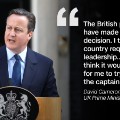
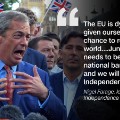

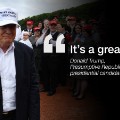

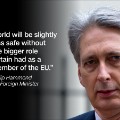
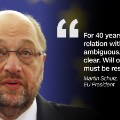
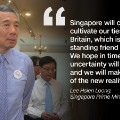
It
is not a stretch to wonder whether the kind of political message that
was so powerful in the referendum -- featuring a harsh critique of free
trade and a demands to "take our country back" -- could prove just as
effective among blue-collar workers in rust belt states in the United
States.
Certainly, it's a message
that Trump has been hammering with success all election season and is at
the center of his claims to be able to remake the U.S. electoral map.
And the billionaire has consistently bested Clinton when voters are
asked who is best equipped to handle the economy.
The
immediate stock market contagion unleashed by the referendum across the
globe represented the worst equity carnage since the start of the Great
Recession in 2008.
If the losses prove short-lived, the impact of the referendum on the U.S. economy and politics could be temporary.
But
if "Brexit" ushers in a period of economic volatility across Europe
that begins to squelch growth, the U.S. economy could be badly affected
-- complicating Clinton's bid to pull off the tough assignment of
winning a third consecutive White House term for the Democrats.
Trump
would meanwhile seize on any slowdown in the U.S. precipitated by
Brexit to argue that Obama's economic management is a failure and it is
time to try something new.
But there are also warning signs for Trump.
Though
he was quick to claim a share of the credit for the British political
earthquake -- placing it in the context of a revolt against global
elites in which he sees himself as a major player -- a prolonged period
of world turmoil could also work against the billionaire former reality
star.
Such an environment could
bolster Clinton's claims that a crisis is no time to choose a president
who has no experience of governing and that her pedigree as a former
secretary of state and relationships with leaders all over the world are
a perfect fit for a perilous moment.
The
Democratic presumptive nominee made that argument in her statement:
"This time of uncertainty only underscores the need for calm, steady,
experienced leadership in the White House to protect Americans'
pocketbooks and livelihoods, to support our friends and allies, to stand
up to our adversaries, and to defend our interests."
Clinton's
campaign worked hard to demonstrate a contrast between Clinton and
Trump as potential leaders in a time of crisis. The Clinton camp also
sought to downplay similarities between the seething political scenes in
the U.K. and the United States.
"It
is important that we recognize that this American election is about
what is happening here in America not what is happening in Yorkshire or
in Cardiff," said Clinton's senior adviser Jake Sullivan on a conference
call.
Sullivan also rejected the
idea that Clinton could find herself overtaken by a similar populist
tide in November, saying she had spent months on the campaign trail and
was intimately familiar with the difficulties facing many working
Americans.
The
possible economic consequences of Brexit in the short-term could be
dwarfed by the geopolitical shakeup that is now looming in the years to
come.
Britain's referendum has
already set off calls in Europe for similar separation votes in other
Eurosceptic nations, threatening to dismantle the economic and political
union that has been a pillar of transatlantic stability for 70 years
and been a crucial partner for the United States.
As
the U.S. faces challenges to its power in Asia from a rising China and
in Europe from a recalcitrant Russia and in the Middle East from a
motley group of insurgent forces, Washington can hardly afford the
splintering of its co-guarantor of Western security.
In
addition, the referendum looks likely to result in the fracturing of
America's closest historic ally, the United Kingdom -- a factor that
could be a diplomatic nightmare for the next president.
In
the hours after the vote, Scotland's First Minister Nicola Sturgeon
announced plans to draft new legislation to allow a second independence
referendum north of the border after pro-EU Scots narrowly voted to stay
in the United Kingdom in 2014.
Though
a Scottish referendum may not take place for years, it will revive
questions about a neutering of British military power and the fate of
Britain's Scotland-based nuclear deterrent -- which nationalists opposed
and is part of NATO's security infrastructure -- that the next U.S.
president will be forced to grapple with.


































No comments:
Post a Comment